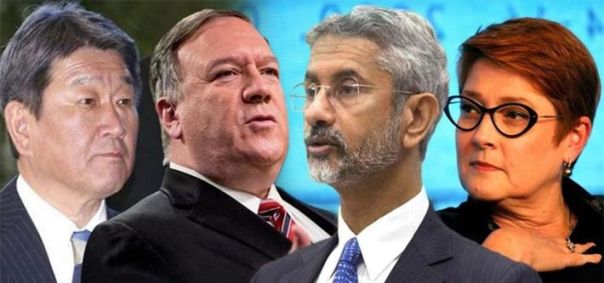Foreign ministers of the Quad, the informal security forum comprising India, the US, Japan and Australia, are expected to hold a much-awaited meeting in Tokyo on October 6 with the objective of tightening strategic cooperation and advance the goal of a free, open and inclusive Indo-Pacific region. The meeting is expected to be followed by consultations at senior officials’ level in November.
The meeting will discuss collaboration among Quad countries in counter-terrorism, cyber and maritime security, development finance, humanitarian assistance and disaster response, according to South Block officials. The ministers are also expected to discuss practical collaborations in developing advanced technologies including 5G and 5G-plus telecom standards as well as securing the sea lanes of communications in the Indo-Pacific.
While Beijing is expected to take aim at the four partners for seeking to target China at the meeting, there has been a sea change since the ministers met informally on the sidelines of the United Nations General Assembly on September 26, 2019. Quad is expected to take steps towards an institutionalized dialogue at the meeting, where Chinese actions since the rise of global pandemic from Wuhan will come under a magnifying glass.
Relationships Changed
The Quad ministerial comes at a time when the Donald Trump administration has made a U-turn on US policy towards China, which was guided by the rapprochement policy tailored by Henry Kissinger 50 years ago under the Republican administration of Richard Nixon. The tough, new US policy towards Communist China was defined by US secretary of state Mike Pompeo in his Nixon Library address on July 24.
The Indian relationship with China has taken a 180-degree turn since the Chennai summit on October 11-12, 2019, after the People’s Liberation Army’s aggression in eastern Ladakh in May. The armies of the two countries are still locked in a staring match in Ladakh with both sides losing soldiers in the June 15 Galwan Valley flare-up and firing in the air in the first week of September after the Indian Army pre-empted the PLA south of Pangong Tso. This is not all.
Australia’s relationship with China, its largest trading partner, has nosedived with Beijing imposing an 80% tariff on barley, launching an anti-dumping investigation of Australian wine, blocking Australian beef, arresting an Australian journalist and banning two academics from visiting China.
The situation with Japan is no different, with Chinese warmongering over the Senkaku Islands in the East China Sea forcing Tokyo to increase its defence budget to a record. Tokyo is also upset over new security laws in Hong Kong and pressure put on democratic Taiwan by Beijing.
In short, all the four Quad partners have their own reasons for being upset with China’s aggressive posture under paramount leader Xi Jinping under the mask of the deadly coronavirus disease (Covid-19) pandemic. The Chinese posture in the Indo-Pacific and the threat it poses to the democratic world will be discussed at the Tokyo ministerial, with all Quadl partners sharing their experiences.
Given that all the Quad partners have a military supply and logistics sharing agreement with each other, the foreign ministers will also take a decision on a four-nation naval exercise under the rubric of Malabar in the Arabian Sea to signal their commitment for free and open navigation in the Indo-Pacific.


















